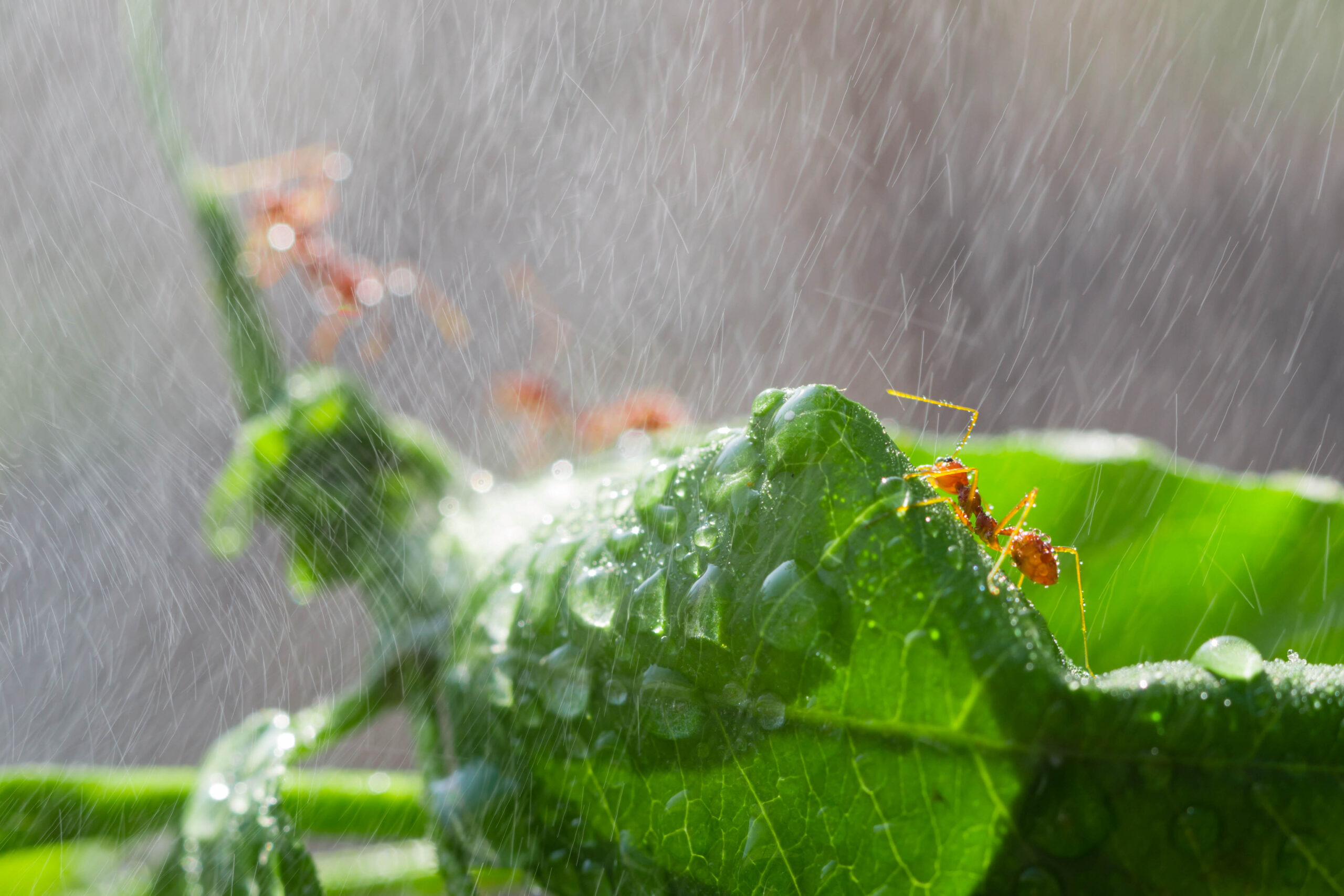Does Spring Rain Affect Pests?
Does Spring Rain Affect Pests?
There is something so peaceful about a spring rain, especially the further we get into the season. Unlike the other seasons, the days following a rainstorm are filled with growth and rejuvenation in the ecosystem. Flowers, plants, and trees continue to bloom and produce healthy leaves, while critters leave their hidden habitats to enjoy the spring sunshine once again. But the constant mixture of rain and warmth can start to mess with the animal kingdom, especially the creatures small enough to be threatened by a bit of rain. Considering the size and anatomy of common insect pests, it is worth wondering: does the spring rain affect pests and their routines? Grab your parka and rain boots: we’re jumping in to find the answer!
The Rain, The Plants, and The Pests

First, it is worth noting that spring rain affects the natural world for better or worse, especially when there are multiple sunny days in between the storms. Both insects and plants are heavily affected by rain and can either benefit from or be destroyed by it. A healthy amount of rain softens the soil and gives the plants enough moisture to produce healthy leaves. When the sun emerges after a storm, it helps the plants recover from all the moisture. It warms their leaves and gives them the opportunity to experience photosynthesis, where plants convert sunlight into energy. As for insects, the exact effects depend on the species and the quantity of rain. Garden pests enjoy the healthy leaves that are produced after the rain, and predatory insects like the abundance of prey that emerges with the sun. But rain can also drown insects that aren’t prepared, which means they are looking for warm shelter. Either way, despite the fact that spring began on March 20, there is not an annual date that spring rains stop and pests aren’t a problem anymore. Since the amount of rainfall varies every year, the insects that are helped or hurt by the rain also differ. Let’s look at the reasons for that in each category.
How Spring Rain Helps Pests

Rain can help pests both directly and indirectly. Directly, some pests need moisture in order to survive. Most living beings need to drink some amount of water, but certain species actually want to live in a damp environment at all times. Cockroaches, centipedes, and silverfish need constant moisture to live, and will dry up if they cannot find moisture in time. Humidity also helps in these cases, but that is more common in summer. Others need moisture to mate and lay their eggs. Mosquitos are the most famous example of this, as they will lay their eggs in any amount of standing water that they can find. This is why they are commonly found near ponds and large puddles. Insects can even benefit from rain when their predators do not. Insect-eaters, like birds and spiders, will hide when the rain starts falling. This gives insects the chance to move homes and look for their own food without the constant fear of a larger creature lurking in the shadows.
The benefits of spring rain with indirect effects apply to a much larger group than the direct benefits. This is because rain affects the plants and soil, which then impacts insects since these are usually their natural homes and food sources. Damp plants can attract various garden pests and fungi to the area, especially with the sprouting of weeds. Invasive weeds need water to grow, just like any other plant, and both weeds and grass notably mature quicker after it rains. More weeds mean the introduction of destructive pests, which will negatively impact crop production if the pests are not handled. It may not sound like a negative to have a bunch of hungry pests handle the frustrating weeds around your garden. That is actually the only positive of this situation; the major negative is that many pests love the fresh green leaves that nearby plants are sporting and will turn to these for their next meal. Even the event of excess spring rain damaging plants can be a positive for certain insects. Some species prefer to lay their eggs in decaying plants in order to give their larvae an immediate food source. Many insects may welcome the spring rains with open arms, but some species would prefer their living conditions to be dry as a bone.
How Spring Rain Hurts Pests

Cooler weather and damp conditions generally slow the development of insects, as these ectothermic critters rely on warm temperatures for their energy levels. But some pests need it to be warm and dry in order to function at their best. Even certain garden pests have this requirement, such as spider mites. Scale insects, flies, and caterpillars all enjoy warmth and rarely make an appearance when it’s rainy and cold outside. When spring rains are more consistent, some insects will constantly be on the move to survive. If their habitats flood, the temperature is too cool, or they cannot find any food, insects will need to find somewhere to take shelter – and fast. Plants are not big fans of massive rainfalls either, as they can gradually become waterlogged and will accrue more damage from garden pests than they would normally.
Trees, however, can benefit from the rain that their insect pests despise. When certain tree species receive constant water, they can build up resin that naturally fights off any pests trying to burrow within the tree. But even the pests that don’t have anything to do with a defensive tree will not enjoy steady spring rains. Many beetles like to devour crops and reproduce in the fields that they are constantly using as their cafeteria. When fields and grasslands flood, the beetles and other insects will not survive. This principle especially applies to the pests that live underground. Many pests live in the topsoil as larvae or grubs, and ant colonies build their massive nests underground. When the spring rains come in, these pests will drown if they are still within the soil. But in general, spring rains can affect pests in different lasting ways, including delaying the inevitable. Pests generally start reproducing in spring, but they cannot lay all the eggs that they normally do if the conditions are still too damp and cool. And if a surprise late freeze happens in spring? Pest populations will dwindle due to the sheer amount that fall victim to the sudden cold temperatures.
Pest Species in the Rain

At this point, it’s evident that spring rains do affect pests in certain ways. Whether it is a positive or negative effect is dependent on the species and amount of rain. To give a clearer idea of this concept, let’s look at how specific pests handle the rainy days of spring.
- Ants: As stated earlier, ants like to keep their colonies in the topsoil. Their nest will quickly flood with excess rain, but the industrious ants can think fast. They will search for higher ground and food to sustain their colony, both of which may lead them into a nearby house.
- Aphids: Surprisingly, aphids actually prefer the conditions to be cool and wet. This is because they need the plants they dine on to be healthy and have plenty of juices. Aphids drink the sap from leaves, stems, and roots, so an abundance of healthy green leaves is their paradise.
- Cutworms: This is another garden pest that likes the cool dampness that comes with spring rains. Cutworms, the larval stage of brown moths, thrive in areas with lots of weeds. The moths lay their eggs there, and the cutworms will stay in the cool soil and emerge to cut through the stems of young plants.
- Mosquitos: These pests clearly love the puddles of still water that remain after a spring rainstorm, but it is not just the results that mosquitos enjoy. Many spring rains are warmer than winter ones, and these temperatures can bring mosquitos out of hiding. They can also fly in light rain since they are aquatic.
- Roaches: Roaches need moisture to survive, but they are proof that you can have too much of a good thing. They commonly hide in sewers and drains, which is fine until the rain starts to cause flooding in these spots. The roaches need to escape and travel upwards to escape drowning, which could lead them straight into a house or building.
- Slugs/Snails: These garden pests would be perfectly content if it rained all the time. Slugs and snails need a lot of moisture to thrive, and they prefer for their food to be damp as well. They devour plants of all kinds, especially when the greenery is healthy and moist.
- Termites: Termites don’t enjoy the actual rain nearly as much as the aftermath. They tunnel deep inside wood, consuming it as they go. But they can’t choose just any wood for this; termites love moisture-damaged wood because it is much better for tunneling than non-damaged wood.
There are three main pest prevention methods when there is a break in spring rains. One is to remove any standing water in the yard to keep mosquitos from laying their eggs there. Tarps, birdbaths, toys, buckets, and plant drainage trays all collect water easily. The second is to weed around plants and the garden somewhat often. Many pests are drawn to weeds as food and shelter, and can use these weeds well into autumn if they are not removed. Thirdly, check the house and fences for any moisture damage. Wood-boring pests enjoy damaged wood and will invade to make their home deep within, which is difficult to treat.
Pointe Works With the Weather
Just because we have entered the season of temperate days separated by periods of rain doesn’t mean quality pest control is out of the question. At Pointe, our team of experienced pest control technicians keeps the weather conditions in mind when providing our effective treatments. If spray treatments and baits are applied carelessly before a rainstorm, they will simply wash away before they have enough time to be effective. Our team will use the weather to determine the path of the customized treatment plan without compromising the efficacy of the treatments. Major rainfall happening during your scheduled appointment? No problem! We are happy to reschedule to a new date and time that fits in your busy schedule, and may call you to suggest this first if we know that the weather will not be conductive with our services and desired results. For the most caring and efficient pest control in town, contact us today to schedule your first service!
Citations
Bailey, S. (2018, June 15). FIRST ALERT: How winter’s cold and spring’s rain impacts insects. WMBF News. Available at https://www.wmbfnews.com/story/38431899/winters-cold-and-springs-rains-impact-on-insects/ (Accessed on February 24, 2023).
DiFonzo, C. (2019, June 18). How will the wet spring impact field crop insects?. MSU Extension – Field Crops. Available at https://www.canr.msu.edu/news/how-will-the-wet-spring-impact-field-crop-insects (Accessed on February 24, 2023).
How spring weather affects treatment timing for weeds, insect pests & tree diseases. (n.d.). LAM Tree Service. Retrieved February 24, 2023, from https://www.lamtree.com/spring-weather-affects-treatment-timing-weeds-insect-pests-tree-diseases/
Pests to watch for when it rains. (2018, April 14). Plunkett’s. Retrieved February 24, 2023, from https://plunketts.net/blog/pests-in-rain
Why you notice more bugs after a spring rain shower. (2020, May 5). Vulcan Termite. Retrieved February 24, 2023, from https://www.vulcantermite.com/garden-pest-control/notice-bugs-spring-rain-shower/
Request a Free Quote Today
(We do not share your data with anybody, and only use it for its intended purpose)


